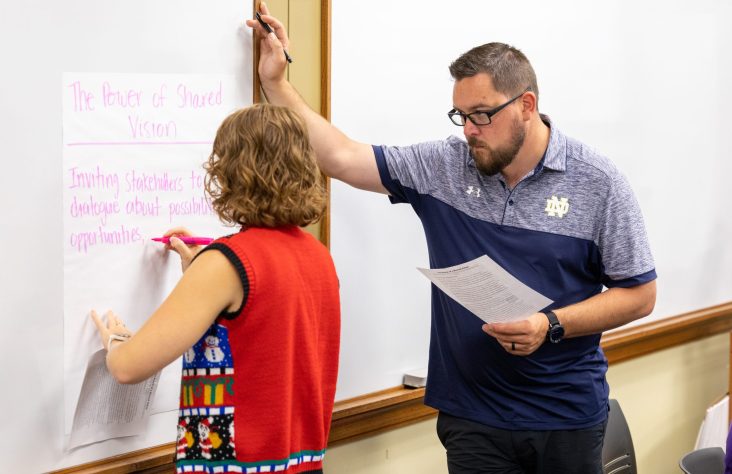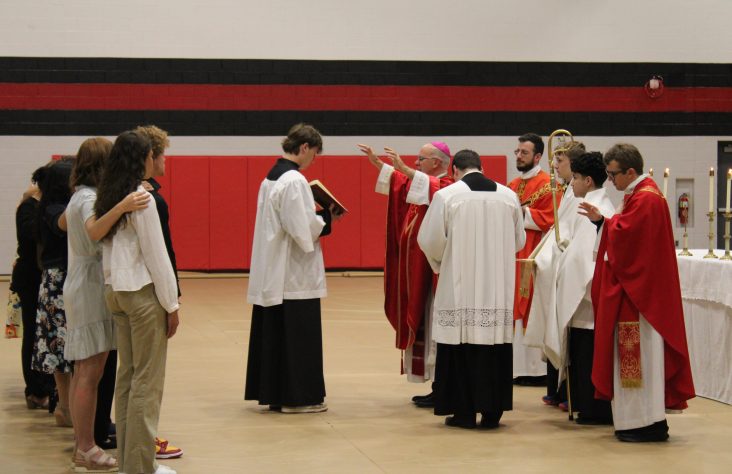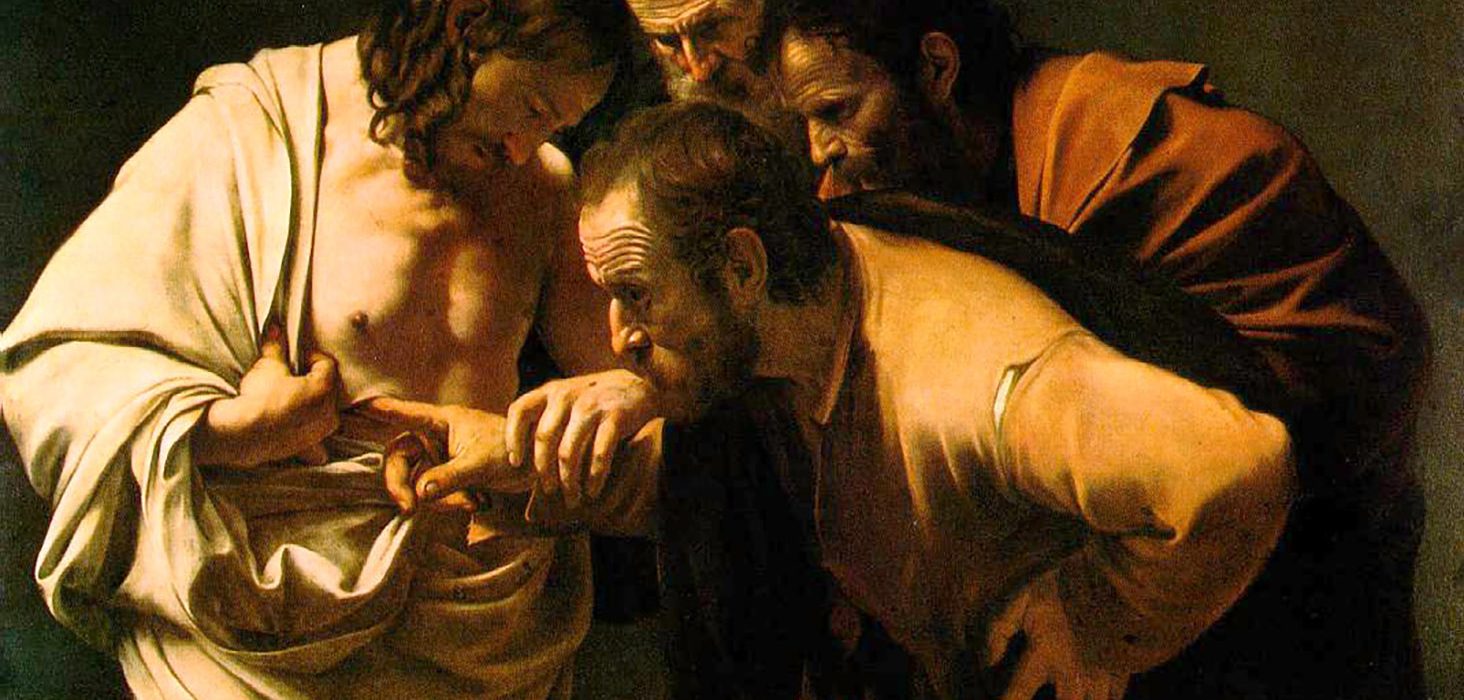April 10, 2018 // Bishop's Column: In Truth and Charity
‘Jesus, my Lord and my God, I trust in you’
The following is an adapted version by Bishop Rhoades of his homily on Divine Mercy Sunday at St. Anthony de Padua Church, South Bend:
I’d like to invite you to reflect on the figure of St. Thomas the Apostle. Thomas was absent on that first Easter night when the Risen Jesus appeared and bestowed the Spirit upon the Apostles. Thomas is often referred to as “the doubting Thomas” since he said to the other apostles that he needed proof to believe that Jesus was alive, that he had risen from the dead. Perhaps we can relate to him when we have difficulties of faith. To him and to us, Jesus says: “Do not be unbelieving, but believe.”
After putting his finger in the nailmarks and his hand into Jesus’ side, Thomas believed. Then he professed the very core of the Christian faith with the simple exclamation” My Lord and my God.” Those famous words sum up the whole of our faith and the main theme of the whole of St. John’s Gospel.
Recall that at the beginning of St. John’s Gospel, he wrote that “in the beginning was the Word, and the Word was with God, and the Word was God.” St. John then made the stupendous statement: “The Word became flesh and dwelt among us.” Now near the end of the Gospel of John, we read THE great Christian profession of faith proclaimed by St. Thomas: “My Lord and my God,” the profession that Jesus Christ is truly Lord and God. St. John even tells us at the end of today’s Gospel that he wrote these things down that we may come to believe that “Jesus is the Christ, the Son of God,” and that through this belief we “may have life in His name.”
When I was a little boy, I was taught at my first Communion to pray silently the words of Thomas “My Lord and my God” when the priest elevated the Host at the consecration. I have been doing that ever since, even now when I am a priest and bishop raising up the Host during the consecration of Mass. It is a profession of our faith that Jesus is truly and really present in the Holy Eucharist. Of course, within this simple profession of faith that St. Thomas proclaimed is the profound core of our faith, that Jesus of Nazareth is truly the eternal Son of God. He is our Savior. He is the way, the truth, and the life. He is the light of the world. He is the bread of life.
St. John wrote in his first letter, which we heard in our second reading, that “the victory that conquers the world is our faith.” St. John wrote: “Who indeed is the victor over the world but the one who believes that Jesus is the Son of God?” St. Thomas, though a stubborn doubter at first, came to believe after He saw Jesus and touched His wounds. But Jesus says to us as He said to Thomas: “Blessed are those who have not seen and have believed.”
Perhaps we are sometimes like Thomas, stubborn in our doubts. Our faith can be weak and we can falter. At such times, it is good to ask the Holy Spirit to strengthen our faith. We have been given the gift of the Holy Spirit to help us to believe. In Baptism and Confirmation, we received the Spirit that Jesus breathed on the Apostles that first Easter night and we have been given a share in His mission to bring His life and light to the world.
I am always inspired by the example of the primitive Church, which we hear about throughout the Easter season in the readings from the Acts of the Apostles. That Spirit which inspired and empowered Peter and the apostles is still with us and we share the same mission entrusted by Christ to the Apostles that first Easter night. Our priests share in Christ’s mission of forgiveness of sins. When Jesus breathed on the apostles that first Easter night, He gave them the Holy Spirit to communicate the forgiveness of sins. He said to them: “Whose sins you shall forgive, they are forgiven them.” Our priests serve among you as men anointed by the Holy Spirit to be instruments of God’s mercy, especially in the confessional. Please pray for them.
Every Catholic parish has the mission of being an oasis of God’s mercy in the desert of the world. We are called to extend God’s mercy to all, especially to the poor, the sick, the suffering and all those who are hurting. We are called to reach out to sinners with the truth of the Gospel of Jesus, to accompany them with the love and mercy of Christ on the road of conversion and freedom from the slavery of sin. We are all on that road of conversion.
Like the early Church we read about in the Acts of the Apostles, our parishes are called to be communities of believers “of one heart and mind,” communities that bear witness to the resurrection of the Lord Jesus, families of faith in which there is no needy person among us, because of our loving support and generosity towards one another.
It was on the eve of Divine Mercy Sunday that Pope St. John Paul II died 13 years ago. John Paul had already prepared the text for his Angelus message for the next day. This is what he wrote: “As a gift of humanity, which sometimes seems bewildered and overwhelmed by the power of evil, selfishness and fear, the Risen Lord offers His love that pardons, reconciles and reopens hearts to love. It is a love that converts hearts and gives peace. How much the world needs to understand and accept Divine Mercy!”
These words of St. John Paul II should still resound in our hearts today: “How much the world needs to understand and accept Divine Mercy!” I encourage devotion to the Divine Mercy in our diocese, a devotion which includes putting into practice the works of mercy, spreading the message of divine mercy by our words and our deeds. This is the mission of the Church. Professing with St. Thomas, “My Lord and my God,” we are called to live this faith in Jesus as Son of God and Savior of the world. We are called to trust in Him. May we entrust ourselves and all our activities to the Lord, praying often with St. Faustina: “Jesus, I trust in you, have mercy upon us and upon the whole world.”
Yes, as St. John Paul II wrote: “How much the world needs to understand and accept divine mercy!” May the Lord bless us with His grace that we may be faithful messengers and servants of God’s mercy here in our diocese! As we pray in the words of Thomas “My Lord and my God,” we can add the prayer of St. Faustina: “Jesus, I trust in you.” May the Risen Lord bless our diocese with His abundant love and mercy!
The best news. Delivered to your inbox.
Subscribe to our mailing list today.






